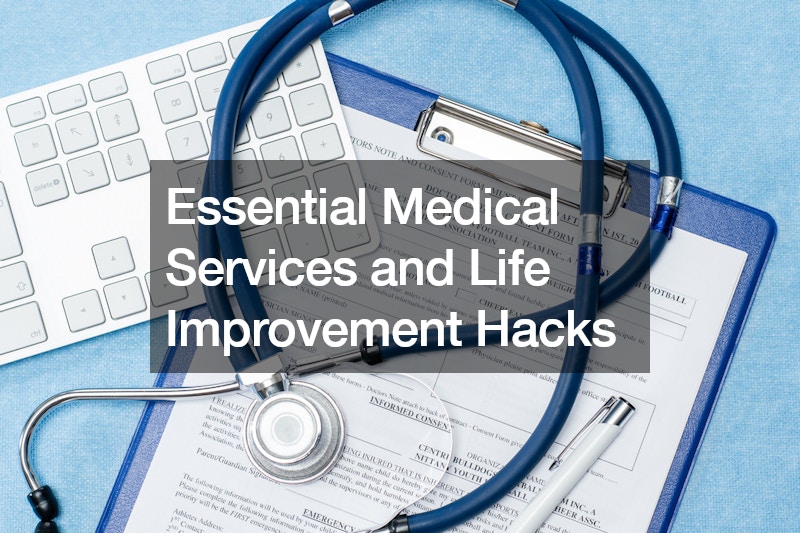Health is a broad concept that encompasses physical, mental, and social well-being. It is not just the absence of disease or illness but rather a state of complete physical, mental, and social well-being. The World Health Organization (WHO) defines health as ‘a complete physical, mental and social well-being and not merely the absence of disease or infirmity.’ However, not many people are healthy in the U.S. This is primarily because of the lack of education on living a healthy lifestyle. This article covers some essential medical services crucial for maintaining good health.
The Importance of Essential Medical Services in Maintaining Good Health
The importance of medical services in maintaining good health cannot be overstated. These services include preventive, diagnostic, and curative services that help individuals stay healthy and treat any health conditions they may have. Here are some essential medical services in maintaining good health.
Pain Management

Pain is a complex and subjective experience that is critical to the body’s defense system. It is essentially the body’s signaling that something is wrong, prompting an individual to take action to prevent further tissue damage. When tissues are damaged from an injury, disease, or other causes, they release chemicals that propagate the pain signal. This process begins at the pain source, travels through the nervous system, up the spinal cord, and finally to the brain, where it is interpreted as pain.
The perception of pain involves several key steps. Firstly, pain sensors (nociceptors) are activated by damage or potential damage to the body. These sensors are found nearly everywhere in the body, including the skin, bones, and organs. After activation, the nociceptors transmit signals to the spinal cord and brain through nerve fibers. The spinal cord processes pain signals and can trigger reflexive actions (like pulling your hand away from a hot surface) before the signals reach the brain for full processing. Once the pain signal reaches the brain, it goes through a series of complex evaluations. The brain assesses the source of the pain, compares it to past experiences, considers potential causes, and calculates an appropriate response. It is in the brain that pain truly becomes a subjective experience—this is why individuals’ tolerance and reaction to pain vary widely. Essential medical services are crucial for addressing pain, as healthcare professionals can help identify the source of pain and provide appropriate treatment.
One of the most common forms of pain is back pain. Back pain treatment options vary and can include physical therapy, medication, or surgery, depending on the cause and severity of the pain. However, prevention is key when it comes to back pain. Maintaining proper posture, exercising regularly, and avoiding heavy lifting are all ways to help prevent back pain. Additionally, incorporating stress-reducing activities like yoga or meditation into your routine can help alleviate tension that contributes to back pain.
Another common form of pain is in the foot and ankle center. Various conditions, such as plantar fasciitis, bursitis, or arthritis can cause these types of pain. Treatment options for foot and ankle pain may include physical therapy, orthotics, or surgery, depending on the underlying cause. However, prevention is also crucial in keeping your feet and ankles healthy. Proper footwear, maintaining a healthy weight, and stretching exercises can all help prevent foot and ankle pain. Essential medical services for this pain may include routine check-ups to catch potential issues early on and provide preventative measures.
Dental Care
Dental care is an integral component of essential medical services, emphasizing the importance of maintaining oral health and hygiene. Regular visits to a dentist play a pivotal role in preventing, diagnosing, and treating oral diseases and conditions. These dental professionals are experts in caring for the teeth, gums, and mouth, offering a wide range of treatments to preserve natural teeth, ensure optimal oral health, and avoid infections that could lead to more serious health issues.
Finding a local dentist you trust and feel comfortable with is crucial. Routine dental check-ups and cleanings are fundamental in preventing dental problems such as tooth decay, gum disease, and oral cancer. These check-ups typically involve thoroughly examining the oral cavity for signs of potential issues and a professional cleaning to remove tartar and plaque buildup that regular brushing and flossing might miss. In addition to preventive care, dentists provide restorative services – like fillings, crowns, and bridges – and cosmetic procedures to improve dental aesthetics. For those experiencing dental issues or concerns, seeking prompt care from a local dentist ensures timely and effective treatment, thus avoiding the progression of dental problems that could lead to more extensive and expensive procedures.
Overall, dental care is a vital aspect of essential medical services, underscoring the significance of regular dental visits in maintaining oral health and overall wellness. Good oral hygiene practices and dentists’ expertise make a significant difference in keeping our mouths healthy and preventing the onset of dental diseases. A bright, healthy smile can also greatly enhance our quality of life and boost self-confidence and self-esteem.
Urgent Care

In essential medical services, urgent care centers play a pivotal role, particularly for those experiencing non-life-threatening personal injuries or illnesses requiring prompt attention. Unlike emergency rooms, designed for life-threatening conditions, urgent care facilities offer a quicker, often more cost-effective solution for individuals needing immediate medical assistance. These centers are equipped to handle various issues, from minor injuries like sprains and fractures to sudden illnesses such as flu or infections. Their accessibility and extended hours make them preferable for patients seeking quality care without the long wait times typically associated with hospital ER visits.
One of the key advantages of urgent care centers is their ability to bridge the gap between primary care doctors and emergency rooms. Urgent care offers a viable alternative for those unable to secure a same-day appointment with their primary care provider or those who encounter health issues after hours. The services provided are comprehensive, covering everything from diagnostics, like X-rays and blood tests, to treatments for various conditions. This ensures that patients receive timely care and alleviates the burden on emergency rooms, allowing them to focus on more severe cases.
Furthermore, the role of urgent care in managing a personal injury cannot be overstated. Accidents or sudden illnesses can occur at any time, and having access to immediate medical attention can significantly impact recovery outcomes. By providing prompt and efficient care, urgent care centers ensure that minor injuries do not escalate into more severe problems, promoting quicker healing and reducing the likelihood of complications.
Urgent care centers are an indispensable component of medical services, offering a practical solution for immediate medical needs. By ensuring access to care for non-life-threatening conditions, they contribute to better health outcomes and support the broader healthcare system by easing the load on emergency services. With their focus on accessibility, efficiency, and comprehensive care, urgent care centers ensure patients receive the right care at the right time.
Physical Therapy and Cosmetic Services
Physical therapy and cosmetic services, often found in medical spas, represent essential healthcare segments, addressing both rehabilitative needs and aesthetic desires. Physical therapy plays a pivotal role in recovery after injuries or surgeries, focusing on enhancing mobility, relieving pain, and improving the overall quality of life. Its scope ranges from personalized exercise regimens to advanced modalities like hydrotherapy and electrical stimulation, catering to each patient’s unique needs.
On the other hand, cosmetic services within medical spas combine the pampering experience of traditional spas with medically supervised treatments. These services can include various procedures, from laser treatments and injectables like Botox to skin rejuvenation therapies. They are designed to enhance physical appearance, bolster self-esteem, and promote mental well-being.
Both physical therapy and cosmetic services underscore a holistic approach to health, recognizing the interconnection between physical condition and mental health. They exemplify the healthcare industry’s evolution towards services that treat medical conditions and aim to improve overall life satisfaction and emotional health. It can be seen as a move towards patient-centered care, prioritizing the individual’s needs and preferences. Moreover, these services also play a crucial role in preventive healthcare by promoting healthy habits and addressing underlying issues before they escalate into more severe conditions. For instance, physical therapy can help prevent future injuries or chronic pain by correcting imbalances or enhancing strength and flexibility. Similarly, cosmetic services can help prevent skin damage and signs of aging by promoting proper skincare and addressing underlying concerns.
Water Treatment

In today’s world, water treatment is vital in safeguarding public health and ensuring access to safe drinking water. This essential service encompasses processes like water purification and using water softeners to enhance water quality for consumption and usage. Water purification systems are critical in removing contaminants, pathogens, and harmful chemicals from water, making it safe for drinking, cooking, and other household needs. On the other hand, water softeners are employed to address hard water issues by removing excess minerals such as calcium and magnesium, which can cause scaling in pipes and appliances and can negatively affect the quality of the water.
The significance of water treatment extends beyond just providing clean, potable water. It also has implications for individual health and the environment. These systems help prevent water-borne diseases and safeguard ecosystems from overburdened pollution by eliminating pollutants and reducing water hardness. Furthermore, they contribute to the longevity of plumbing systems and appliances, ensuring that households and businesses operate efficiently. Investing in advanced water treatment technologies is essential for maintaining public health standards, meeting environmental conservation goals, and supporting sustainable development worldwide.
In addition to its essential role in promoting public health and preserving the environment, water treatment also plays a crucial role in supporting essential medical services. Hospitals, clinics, and other healthcare facilities rely heavily on clean, safe water for various purposes, such as patient care, sanitation, and laboratory testing. Without adequate water treatment, these medical facilities would struggle to provide quality healthcare services and maintain hygienic standards. Advanced water treatment technologies support the healthcare industry, ensure patients receive safe and effective treatments, and minimize the risk of infection and other health hazards.
Moreover, water treatment also has economic benefits for communities and businesses. By ensuring a reliable supply of clean water, these systems support industries such as agriculture, manufacturing, and tourism, which heavily rely on water for their operations. In addition, investing in advanced water treatment helps reduce the costs associated with treating water-related illnesses and repairing damages caused by polluted water sources. This saves money for individuals and businesses and contributes to overall economic growth by promoting a healthier population and environment.
Home Construction and Remodeling

Home construction and remodeling are critical sectors within the construction industry, involving home builders and building contractors specialized in creating or modifying residential spaces. These processes not only cater to the need for new housing but also adapt existing homes to meet evolving lifestyle demands, incorporate modern amenities, or enhance the sustainability of structures.
In the context of home construction, builders and contractors play pivotal roles. Home builders are often involved from the ground up, from planning and designing to constructing new homes. They transform architectural visions into tangible structures, ensuring that new residences meet current safety standards, sustainability practices, and homeowner expectations. Home building contractors, meanwhile, might specialize in specific aspects of construction, such as carpentry, plumbing, or electrical installations, contributing their expertise to various stages of the building process.
Remodeling, however, focuses on altering existing homes’ design, structure, or style. This could involve expansions, redesigns, or updates to modernize living spaces, improve energy efficiency, or enhance property value. Home remodeling allows homeowners to customize their living spaces to better suit their needs, aesthetic preferences, and the functionalities required for modern living, from smart home technologies to eco-friendly materials.
Home construction and remodeling are essential for meeting a growing population’s housing demands and supporting essential medical services within communities. Well-constructed and thoughtfully designed homes can contribute to the overall well-being of residents, offering safe, comfortable, and health-promoting environments. Additionally, modern, energy-efficient homes and remodeled spaces can play a significant role in environmental conservation efforts, reducing the carbon footprint of residential buildings and supporting sustainable development goals.
Good health is equal to the medical services you get annually. The following essential medical services listed above can provide you with the right health information and help identify any potential problems. Preventative care services, such as regular check-ups, screenings, and vaccinations, can detect underlying health issues early on and prevent them from developing into more severe conditions. Primary care physicians and other medical specialists are crucial in providing these essential services. By regularly visiting a primary care provider, individuals can establish a strong foundation for good health and receive timely interventions if any issues arise.


